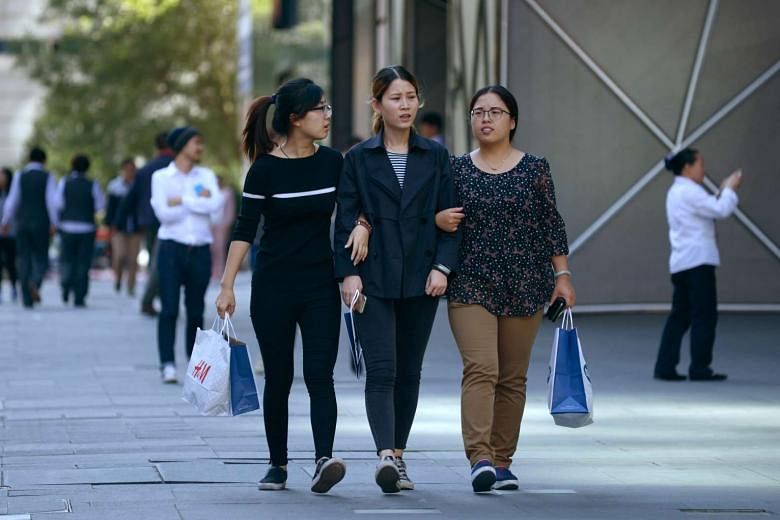HONG KONG (AFP) - Demonised by the government, pestered by their parents and pitied by the media, for China's "leftover women" the pressure to settle down can be unbearable, author Leta Hong Fincher says.
But emboldened by a nascent organised feminist movement and the proliferation of social media, some women are starting to fight back, she adds.
"I think there are many more middle-class women in China who are aware - who have had an awakening about their rights," comments Fincher, whose book, Leftover Women: The Resurgence Of Gender Inequality In China, highlighted the precarious position of well-educated, urban, professional women who choose to remain single after the age of 27.
From self-help books to mass matchmaking events, there is now a mini industry dedicated to help the "sheng nu", or leftover women, fall in line with government and in turn, society's expectations of marriage and procreation.
"The stigma of being a single woman is universal but the threshold in China - the point where one is regarded as undesirably single - is very young," Fincher explains. "Women are expected to settle down in their mid-20s arguably before they know what they want and have built up their career or financial independence, while in the UK or the US it is perhaps late 30s, early 40s.
"But what really distinguishes mainland China is the massive state propaganda machine pushing the message that educated women should marry and have children young for the good of Chinese society."
Authorities coined the derogatory term "leftover women" to shame or scare urban professionals into marriage, with the ultimate aim of creating "high quality" babies, she says, citing a 2007 China State Council plan to improve the population "quality".
Fincher adds that the "campaign was backed up by many agencies of the state" including government departments and media outlets.
"Even the medical establishment has pushed the message - women in their mid-20s have told me that their doctors are telling (them) to hurry up as they are passing their best child-bearing years, warning them if they wait, their children will be handicapped."
The China All-Women's Federation, set up in 1949 ostensibly to protect rights, joined the onslaught, publishing a series of posts on its website with subjects such as "Do Leftover Women Really Deserve Our Sympathy?".
But the release of Fincher's book in early 2014 triggered a debate on China's social media platforms and a modest backlash is now taking place.
Fincher, who lectures at the Centre for China Studies at the Chinese University of Hong Kong, points to the huge response to 41-year-old actress Xu Jinglei's confirmation she had gone to the US to freeze her eggs, a practice banned for single women on the mainland.
State-run broadcaster CCTV later ran a report on the subject, defending the ban and highlighting the risks surrounding the procedure, prompting more than 30,000 comments on the station's Weibo account, many attacking state policy.
"There was tremendous social media discussion about women's rights and their bodies. That kind of public discussion is relatively new." Fincher describes the arrest of the so-called Feminist Five as an "important turning point" in China's burgeoning organised women's rights movement. The group were detained for "picking quarrels and provoking trouble" after planning activities to raise awareness about sexual harassment.
Authorities, as ever, were quick to quash any signs of organised activism - the women were detained for more than a month and remain under surveillance - but Fincher argues the ensuing debate on social media forums such as WeChat and Weibo marked a step forward.
"Word got around quickly and people were talking about the issues facing women, and sexism in China today. Again, this kind of discussion is new. Younger women I have spoken to do feel they want more of a say over their lives. They are saying 'this is nonsense - I won't be bullied'." she says.
There are other signs the barrage is softening, Fincher adds. The China All-Women's Federation has deleted many of its harshest posts on the subject of leftover women, and the "brutal crudity of the state media" hammering home the message has lessened.
Fincher says the government wants to shame well-educated women into marriage due to a desire to produce more babies from elite stock. She explains: "They regard it as women's duty to the nation to have a 'high quality' child. To safeguard China's position in the world." Authorities announced Thursday that couples would be allowed two offspring, ending a controversial one-child policy that created a severe gender imbalance, in part caused by sex selection practices due to a traditional preference for boys. According to state newswire Xinhua, China has around 30 million more men than women.
At face value this should put women at a premium, but Fincher says the disparity tends to be greatest in rural areas, in cities women are still "persuaded to settle" as their parents fear they will be unwanted if they wait too long.
"Most urban educated women are still succumbing to marriage pressure, but things are changing," Fincher says, adding that some are fighting expectations and delaying or avoiding marriage.
"Women in urban China are becoming more like their counterparts in Japan, Taiwan or South Korea." But she concedes the abolition of the one-child policy could create fresh issues.
She explains: "We are likely to see new propaganda urging urban, educated women to have two children. This may well create new pressures on women in their 20s to marry, so they can schedule in time to have two children, but it's too early to tell."

